
Abdur Rashid Kardar (1904–1989) was an Indian film actor, director and producer. He is credited with establishing the film industry in the Bhati Gate locality of Lahore, British India.

Pagal is a 1940 Indian Hindi-language film. It was the fourth highest grossing Indian film of 1940. The psycho-social melodrama was directed by A. R. Kardar for Ranjit Movietone. Kardar also wrote the dialogues and story for the film. Khemchand Prakash composed the music with lyrics written by D. N. Madhok. The film's protagonist was Prithviraj Kapoor playing a doctor with psychological problems, working in a "lunatic asylum". The rest of the cast included Trilok Kapoor, Madhuri, Sitara Devi, Noor Mohammed Charlie, Khatoon, and Sunalini Devi.
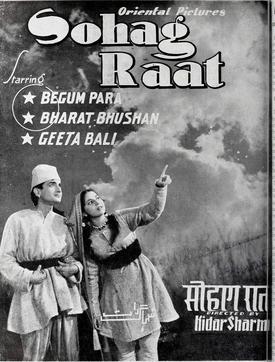
Suhaag Raat ( also called Sohag Raat, is a 1948 Hindi film of Indian cinema directed by Kidar Sharma. A romantic drama, it was the third film produced by Oriental Pictures and the first film to be distributed by the newly-founded company Varma Films. The story was a joint effort by F. A. Mirza and V. Sharma, while the screenplay, dialogue and lyrics were written by Kidar Sharma. The music was composed by Snehal Bhatkar, with cinematography by D. K. Ambre and D. C. Mehta. Geeta Bali made her debut in a lead feature film role with this movie, which co-starred Bharat Bhushan and Begum Para. The rest of the cast included Pesi Patel, Nazir Kashmiri, S. Nazir, Nazira and Shanta Kumar.
Armaan (transl. Desire) also called Arman, is a Bollywood film. It was released in 1942. Arman was the first film that Kidar Sharma directed for Ranjit Studios and also his first in Bombay since his shift from Calcutta. The story, dialogue and lyrics were also by Sharma. It had music by Gyan Dutt. The cinematographer was D. K. Ambre. The cast included Motilal, Shamim, Nagendra Majumdar, Bhagwandas, and Rajkumari.

Ghar Sansar is a Bollywood film. It was released in 1942. The film was a family melodrama produced by Sunrise Pictures and directed by Vishnu M. Vyas, who also wrote the screenplay. The story was written by Mohan G. Dave. The music was composed by Shyam Babu with dialogues and lyrics by Ehsan Rizvi. It starred Sardar Akhtar, Mazhar Khan, Nazir and Kajjan in the main roles.

Watan (transl. Homeland) is a 1938 Hindustani costume drama film directed by Mehboob Khan. Produced by Sagar Films, the film had story by Mehboob Khan and Wajahat Mirza. The cinematographer, as for most Sagar films, was Faredoon Irani. Following the successful music of Manmohan (1936), Sagar Movietone retained Anil Biswas as the in-house music director, scoring music for Watan along with other releases of the time from the studio. The cast of the film included Kumar, Bibbo, Maya Banerjee, Yakub Lala, Sitara Devi and Kayam Ali.

Mehtab (1913–1997) was an Indian actress of Hindi/Urdu films who worked from 1928 to 1969. She was born in Sachin, Gujarat, to a Muslim family and named Najma. Her father, Nawab Sidi Ibrahim Mohammad Yakut Khan III, was the Nawab of Sachin, near Surat in the state of Gujarat. Starting her career in the late 1920s with small roles in films like Second Wife (1928), Indira B. A. (1929) and Jayant (1929), she went on to do character roles before acting in the lead opposite Ashraf Khan in Veer Kunal (1932). After almost a decade of doing mainly action-oriented roles, she came into prominence with the Kidar Sharma-directed Chitralekha (1941).

Holi is a 1940 Hindi/Urdu social drama film directed by A. R. Kardar. Holi was produced by Ranjit Movietone and had music composed by Khemchand Prakash with lyrics by D. N. Madhok. It had Khursheed and Motilal starring in the lead with Sitara Devi, Ishwarlal, Keshavrao Date, Dixit, Ghory and Manohar Kapoor.
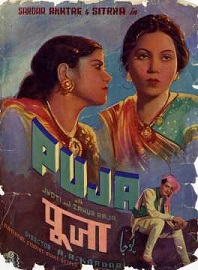
Pooja (Worship) is a 1940 Indian Hindi/Urdu-language psychological drama film directed by A. R. Kardar. The music director was Anil Biswas, with lyrics by Khan Shatir Ghaznavi. Produced by National Studios, the story, screenplay and dialogue writer was M. Sadiq and the cinematographer was P. G. Kukde. The film starred Sardar Akhtar, Zahur Raja, Sitara Devi, Jyoti, Sankatha Prasad, Sunalini Devi, Bhudo Advani and Baby Meena.

Thokar also called The Kick is 1939 Hindi/Urdu film directed by A. R. Kardar. Produced by Chandulal Shah for his production banner Ranjit Movietone, it had music by Gyan Dutt. The story writer was M. Sadiq, with cinematography by Gordhanbhi Patel. The cast included Kumar, Ishwarlal, Madhuri, Yakub, Noor Mohammed Charlie, Ram Marathe, Waheedan Bai and Dixit.

Milap (transl. the union is a 1937 Indian Hindi/Urdu-language social drama film directed by A. R. Kardar. Produced under the Moti Mahal Pictures banner, it had music composed by K. C. Dey. Milap was a big success for the actress Rampyari.
Farebi Daku also called Mysterious Bandit is a 1931 action silent film produced and directed by A. R. Kardar. Kardar set up his own production company "United Players Corporation" in 1928 and in quick succession produced and directed seven pictures, Husn Ka Daku (1929), Safdar Jung (1930), Sarfarosh (1930), Farebi Shahzada (1931), Khooni Katar (1931), Farebi Daku and The Wandering Dancer or Awara Raqasa. Awara Raqasa was the only film out of the seven produced by Kardar, which was directed by J. K. Nanda, who had received his direction and cinematography training in Germany.

Jeevan Prabhat is a 1937 Hindi film social drama, produced by Bombay Talkies and directed by Franz Osten. The music director was Saraswati Devi with lyrics and dialogues by J. S. Casshyap. The screenplay was by Niranjan Pal. The film's "star value" was Devika Rani, with Kishore Sahu making his debut as an actor in the film. The cast included another debutant, Renuka Devi, with Mumtaz Ali, Maya Devi and M. Nazir.

Bhabhi (Sister-in-Law) is a 1938 social family drama Hindi film directed by Franz Osten. The film was based on a Bengali novel written by Sharadindu Bandyopadhyay called "Bisher Dhoan". Bandyopadhyay was a famous Bengali novelist and short story writer also known as the creator of the fictional detective Byomkesh Bakshi. The cinematographers were Wirsching and Pareenja. Dialogues and lyrics by J. S. Casshyap. V. H. Desai, the comedian, got his "big break" in Bhabhi when he joined Bombay Talkies. He became popular as the nervous father of the heroine Renuka Devi. S. N. Tripathi started his acting with a small role in the film. The film had the new found Renuka Devi in the lead.
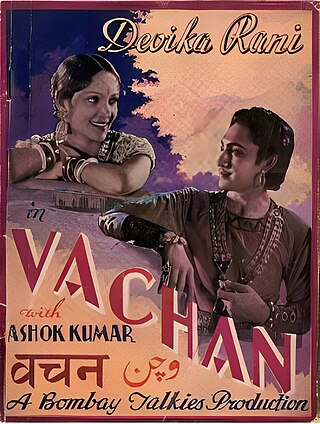
Vachan is a 1938 costume drama Hindi film directed by Franz Osten. The regular Bombay Talkies writer, Niranjan Pal, walked out of the Bombay Talkies production team after an altercation with Himanshu Rai in 1936. Saradindu Bandyopadhyay, a famous writer known also for creating Byomkesh Bakshi, replaced Pal in the story department, writing for films like Nirmala and Vachan in 1938 and Durga in 1939. The screenplay was by Agha Jani Kashmiri, with dialogues and lyrics by J. S. Kashyap. The music was composed by Saraswati Devi aided by J. S. Kashyap. The film starred Devika Rani and Ashok Kumar, a popular pair from Bombay Talkies who worked in seven films together. Devika Rani remained the bigger star with Kumar's name being "over-shadowed" in the credit rolls, as well as the publicity of the film.
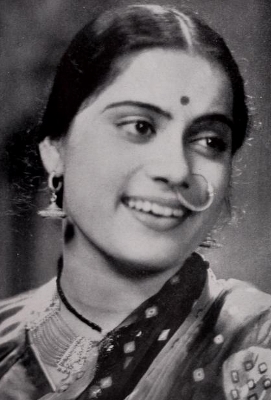
Shanta Apte (1916–1964) was an Indian actress-singer who worked in Marathi and Hindi cinema. Renowned for her roles in films like Duniya Na Mane/Kunku (1937) and Amar Jyoti (1936) under the Prabhat Films banner, she was active in Indian cinema from 1932 to 1958. Apte's impact on Marathi cinema "paralleled" that of Kanan Devi in Bengali cinema. Along with Kanan Devi, Apte is cited as one of the "great singing stars" from before the playback singing era. Apte began her career in films playing the role of a young Radha in the Marathi film Shyamsunder (1932). She joined Prabhat Films acting in her first Hindi language film Amrit Manthan in (1934).

Bibbo was a music composer, singer and actress who worked in both Indian and Pakistani films. She acted in Indian cinema from 1931 to 1947 before moving to Pakistan, following Partition of India in 1947. She started her acting career with Ajanta Cinetone Ltd. in 1933, working with directors like M. D. Bhavnani and A. P. Kapoor. She was one of the top leading ladies of the 1930s along with actresses like Devika Rani, Durga Khote, Sulochana, Mehtab, Shanta Apte, Sabita Devi, Leela Desai and Naseem Banu. She was referred to as "one of the most important female stars of the 1930s and 1940s". Her fame had her featured in the lyrics of a popular song from the film Gharib Ke Lal (1939) sung by Mirza Musharraf and Kamla Karnataki, with music by Sagheer Asif and lyrics by Rafi Kashmiri. "Tujhe Bibbo Kahoon Ke Sulochana", where Sulochana referred to another popular actress of the time. This was the first time a song featuring famous actors was used in the lyrics of a film song.
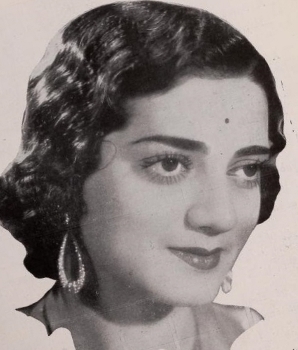
Sabita Devi (1914–1965) was a Hindi film actress in Indian cinema. She is stated to be one of the "prominent" leading ladies of the "pioneering era" of Indian cinema along with Mehtab, Bibbo, Durga Khote, Gohar, Devika Rani and Seeta Devi. A Jewish by birth, she changed her name to find acceptability in Hindi cinema like the other Anglo-Indian and Jewish actresses of her time, Sulochana, Seeta Devi, Madhuri, and Manorama. After initially working with British Dominion Films Ltd., Calcutta, she shifted to Bombay and performed mainly in films produced by Sagar Movietone with her co-star in most films being Motilal. Some of the popular films with Motilal were Dr. Madhurika (1935) and Kulvadhu (1937) directed by Sarvottam Badami. Their first film together was Shaher Ka Jadoo (1934), which was also Motilal's debut film, and then Lagna Bandhan (1936) both directed by Kaliprasad Ghosh. She acted in Silver King (1935) with Motilal. It was an action film directed by C. M. Luhar, which became a "huge success".

Mazhar Khan was an actor, producer, and director in Indian Cinema. He began his career as a police officer, which he left to study law for a short period. After abandoning his studies, he came to Bombay and started his career in cinema with the silent film Fatal Garland (1928) opposite the top actress of the time, Ermeline. He became a popular actor, gaining success in several silent films. During his stint in silent films he worked with directors such as Bhagwati Prasad Mishra, Ezra Mir, Moti P. Bhagnani, R. S. Chowdhary, and M. D. Bhavnani. Magazines in the 1940s compared Khan to Hollywood actors such as Paul Muni, Bela Lugosi and Boris Karloff.
Zahur Raja was an actor, producer, director and singer in Indian and Pakistan Cinema. He was known for his roles in films Mirza Sahiban (1939), Pooja (1940), Sikandar (1941), Badil (1942), Sewa (1942), Mazaaq (1943), O Panchhi (1944), Panchhi (1944), Bhai (1944), Ghazal (1945), Anmol Ghadi (1946).


















